formerly eScholarship Editions


|
|
|
|
Your search for
'History of Science' in subject
found 11 book(s). | Modify Search | Displaying 1 - 11 of 11 book(s) | |
| 1. | 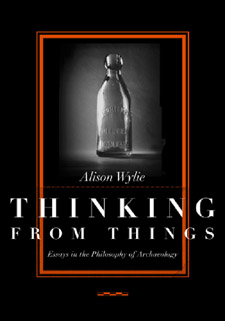 | Title: Thinking from things: essays in the philosophy of archaeology Author: Wylie, Alison Published: University of California Press, 2002 Subjects: Philosophy | Archaeology | History of Science Publisher's Description: In this long-awaited compendium of new and newly revised essays, Alison Wylie explores how archaeologists know what they know. Examining the history and methodology of Anglo-American archaeology, Wylie puts the tumultuous debates of the last thirty years in historical and philosophical perspective. Similar Items |
| 2. | 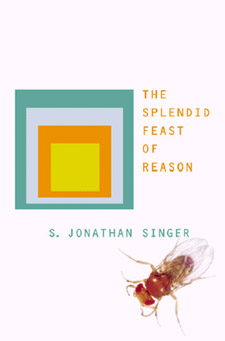 | Title: The splendid feast of reason Author: Singer, Seymour Jonathan 1924- Published: University of California Press, 2001 Subjects: Science | History of Science | Philosophy Publisher's Description: Jonathan Singer's witty, erudite book is a celebration of rationality and an urgent call to make use of intelligence and reason to better cope with human problems. Emphasizing the importance of rationality's greatest achievement, modern science, Singer - one of the foremost biologists of our era - argues that for the first time in several million years humanity has at its disposal the tools for an objective understanding of the external world. Singer demonstrates that, today more than ever, the fullest exercise of rationality is essential if humanity is to rein in a runaway technology and control an explosion of the human population that together threaten to devastate life on this planet within only a few more generations. The intrusion of reason and rationality into our largely irrational world has been painfully slow, uneven, and often unwelcome. Singer explains that for rationalists the founding of modern science - which took place only a few hundred years ago - has overthrown many of the myths of conventional wisdom and dogmas of traditional religions. Yet these beliefs still hold sway over the irrational world, obstructing efforts to deal sensibly with the problematic future of mankind. The core of The Splendid Feast of Reason is an engaging and accessible account of the knowledge that modern science provides. Singer offers an absorbing discussion of how life works, of the nature of reproduction, aging, and death, and of the necessary fragility of the individual life compared to the resilience of life itself. He emphasizes the primary role of the genes in determining the structural organization and the behaviors of living things, including humans. He also stresses the nature and mechanisms of biological evolution, mechanisms that have now been placed in jeopardy because of human ignorance and irrational appetites. Finally, Singer delves into the enigma of the real world with its irrational and chaotic operations and offers suggestions of how a rationalist can not only survive, but thrive in it. [brief] Similar Items |
| 3. | 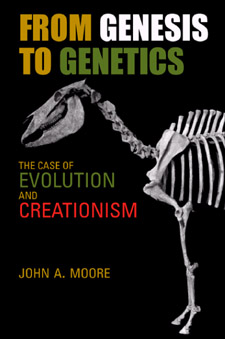 | Title: From Genesis to genetics: the case of evolution and creationism Author: Moore, John Alexander 1915- Published: University of California Press, 2002 Subjects: Science | Christianity | History of Science Publisher's Description: The clash between evolution and creationism is one of the most hotly contested topics in education today. This book, written by one of America's most distinguished science educators, provides essential background information on this difficult and important controversy. Giving a sweeping and balanced historical look at both schools of thought, John A. Moore shows that faith can exist alongside science, that both are essential to human happiness and fulfillment, but that we must support the teaching of science and the scientific method in our nation's schools. This highly informative book will be an invaluable aid for parents, teachers, and lawmakers, as well as for anyone who wants a better understanding of this debate. From Genesis to Genetics shows us why we must free both science and religion to do the good work for which each is uniquely qualified. Using accessible language, Moore describes in depth these two schools of thought. He begins with an analysis of the Genesis story, examines other ancient creation myths, and provides a nuanced discussion of the history of biblical interpretation. After looking at the tenets and historical context of creationism, he presents the history of evolutionary thought, explaining how it was developed, what it means, and why it is such a powerful theory. Moore goes on to discuss the relationship of nineteenth-century religion to Darwinism, examine the historic Scopes trial, and take us up to the current controversy over what to teach in schools. Most important, this book also explores options for avoiding confrontations over this issue in the future. Thoughtfully and powerfully advocating that the teaching of science be kept separate from the teaching of religion, Moore asks us to recognize that a vigorous and effective scientific community is essential to our nation's health, to our leadership role in the world, and to the preservation of a healthy environment. [brief] Similar Items |
| 4. | 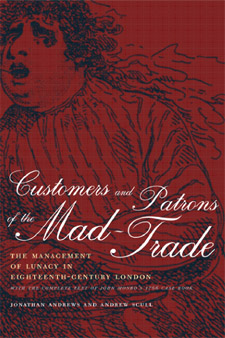 | Title: Customers and patrons of the mad-trade: the management of lunacy in eighteenth-century London: with the complete text of John Monro's 1766 case book Author: Andrews, Jonathan 1961- Published: University of California Press, 2003 Subjects: History | History of Science | Psychology | Social Problems | Psychiatry Publisher's Description: This book is a lively commentary on the eighteenth-century mad-business, its practitioners, its patients (or "customers"), and its patrons, viewed through the unique lens of the private case book kept by the most famous mad-doctor in Augustan England, Dr. John Monro (1715-1791). Monro's case book, comprising the doctor's jottings on patients he saw in the course of his private practice--patients drawn from a great variety of social strata--offers an extraordinary window into the subterranean world of the mad-trade in eighteenth-century London. The volume concludes with a complete edition of the case book itself, transcribed in full with editorial annotations by the authors. In the fragmented stories Monro's case book provides, Andrews and Scull find a poignant underworld of human psychological distress, some of it strange and some quite familiar. They place these "cases" in a real world where John Monro and othersuccessful doctors were practicing, not to say inventing, the diagnosis and treatment of madness. [brief] Similar Items |
| 5. | 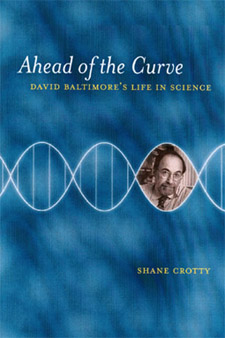 | Title: Ahead of the curve: David Baltimore's life in science Author: Crotty, Shane 1974- Published: University of California Press, 2001 Subjects: Autobiographies and Biographies | History of Science | Science Publisher's Description: Shane Crotty's biography of David Baltimore details the life and work of one of the most brilliant, powerful, and controversial scientists of our time. Although only in his early sixties, Baltimore has made major discoveries in molecular biology, established the prestigious Whitehead Institute at MIT, been president of Rockefeller University, won the Nobel Prize, and been vilified by detractors in one of the most scandalous and protracted investigations of scientific fraud ever. He is now president of Caltech and a leader in the search for an AIDS vaccine. Crotty not only tells the compelling story of this larger-than-life figure, he also treats the reader to a lucid account of the amazing revolution that has occurred in biology during the past forty years. Basing his narrative on many personal interviews, Crotty recounts the milestones of Baltimore's career: completing his Ph.D. at Rockefeller University in eighteen months, participating in the anti - Vietnam War movement, winning a Nobel Prize at age thirty-seven for the codiscovery of reverse transcriptase, and co-organizing the recombinant DNA/genetic engineering moratorium. Along the way, readers learn what viruses are and what they do, what cancer is and how it happens, the complexities of the AIDS problem, how genetic engineering works, and why making a vaccine is a complicated process. And, as Crotty considers Baltimore's public life, he retells the famous scientific fraud saga and Baltimore's vindication after a decade of character assassination. Crotty possesses the alchemical skill of converting technical scientific history into entertaining prose as he conveys Baltimore's huge ambitions, intensity, scientific genius, attitude toward science and politics, and Baltimore's own view about what happened in the "Baltimore Affair." Ahead of the Curve shows why with his complex personality, keen involvement in public issues, and wide-ranging interests David Baltimore has not only shaped the face of American science as we know it today, but has also become a presence in our culture. [brief] Similar Items |
| 6. | 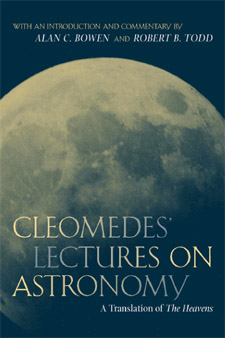 | Title: Cleomedes' lectures on astronomy: a translation of The heavens Author: Cleomedes Published: University of California Press, 2004 Subjects: Classics | Science | Astronomy | History of Science | Classical Philosophy Publisher's Description: At some time around 200 A.D., the Stoic philosopher and teacher Cleomedes delivered a set of lectures on elementary astronomy as part of a complete introduction to Stoicism for his students. The result was The Heavens (Caelestia), the only work by a professional Stoic teacher to survive intact from the first two centuries A.D., and a rare example of the interaction between science and philosophy in late antiquity. This volume contains a clear and idiomatic English translation - the first ever - of The Heavens, along with an informative introduction, detailed notes, and technical diagrams. This important work will now be accessible to specialists in both ancient philosophy and science and to readers interested in the history of astronomy and cosmology but with no knowledge of ancient Greek. [brief] Similar Items |
| 7. | 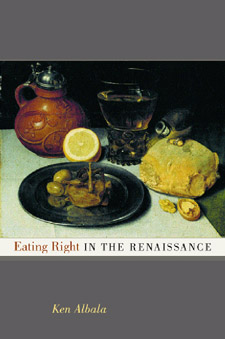 | Title: Eating right in the Renaissance Author: Albala, Ken 1964- Published: University of California Press, 2002 Subjects: Food and Cooking | Renaissance History | History of Science | History of Food Publisher's Description: Eating right has been an obsession for longer than we think. Renaissance Europe had its own flourishing tradition of dietary advice. Then, as now, an industry of experts churned out diet books for an eager and concerned public. Providing a cornucopia of information on food and an intriguing account of the differences between the nutritional logic of the past and our own time, this inviting book examines the wide-ranging dietary literature of the Renaissance. Ken Albala ultimately reveals the working of the Renaissance mind from a unique perspective: we come to understand a people through their ideas on food. Eating Right in the Renaissance takes us through an array of historical sources in a narrative that is witty and spiced with fascinating details. Why did early Renaissance writers recommend the herbs parsley, arugula, anise, and mint to fortify sexual prowess? Why was there such a strong outcry against melons and cucumbers, even though people continued to eat them in large quantities? Why was wine considered a necessary nutrient? As he explores these and other questions, Albala explains the history behind Renaissance dietary theories; the connections among food, exercise, and sex; the changing relationship between medicine and cuisine; and much more. Whereas modern nutritionists may promise a slimmer waistline, more stamina, or freedom from disease, Renaissance food writers had entirely different ideas about the value of eating right. As he uncovers these ideas from the past, Ken Albala puts our own dietary obsessions in an entirely new light in this elegantly written and often surprising new chapter on the history of food. [brief] Similar Items |
| 8. | 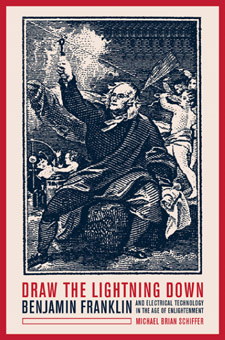 | Title: Draw the lightning down: Benjamin Franklin and electrical technology in the Age of Enlightenment Author: Schiffer, Michael B Published: University of California Press, 2003 Subjects: History | Urban Studies | History of Science | Anthropology | American Studies | European History Publisher's Description: Most of us know - at least we've heard - that Benjamin Franklin conducted some kind of electrical experiment with a kite. What few of us realize - and what this book makes powerfully clear - is that Franklin played a major role in laying the foundations of modern electrical science and technology. This fast-paced book, rich with historical details and anecdotes, brings to life Franklin, the large international network of scientists and inventors in which he played a key role, and their amazing inventions. We learn what these early electrical devices - from lights and motors to musical and medical instruments - looked like, how they worked, and what their utilitarian and symbolic meanings were for those who invented and used them. Against the fascinating panorama of life in the eighteenth century, Michael Brian Schiffer tells the story of the very beginnings of our modern electrical world. The earliest electrical technologies were conceived in the laboratory apparatus of physicists; because of their surprising and diverse effects, however, these technologies rapidly made their way into many other communities and activities. Schiffer conducts us from community to community, showing how these technologies worked as they were put to use in public lectures, revolutionary experiments in chemistry and biology, and medical therapy. This story brings to light the arcane and long-forgotten inventions that made way for many modern technologies - including lightning rods (Franklin's invention), cardiac stimulation, xerography, and the internal combustion engine - and richly conveys the complex relationships among science, technology, and culture. [brief] Similar Items |
| 9. |  | Title: On her own terms: Annie Montague Alexander and the rise of science in the American West Author: Stein, Barbara R 1955- Published: University of California Press, 2001 Subjects: Autobiographies and Biographies | History of Science | Paleontology | California and the West | Women's Studies Publisher's Description: At a time when women could not vote and very few were involved in the world outside the home, Annie Montague Alexander (1867-1950) was an intrepid explorer, amateur naturalist, skilled markswoman, philanthropist, farmer, and founder and patron of two natural history museums at the University of California, Berkeley. Barbara R. Stein presents a luminous portrait of this remarkable woman, a pioneer who helped shape the world of science in California, yet whose name has been little known until now. Alexander's father founded a Hawaiian sugar empire, and his great wealth afforded his adventurous daughter the opportunity to pursue her many interests. Stein portrays Alexander as a complex, intelligent, woman who--despite her frail appearance--was determined to achieve something with her life. Along with Louise Kellogg, her partner of forty years, Alexander collected thousands of animal, plant, and fossil specimens throughout western North America. Their collections serve as an invaluable record of the flora and fauna that were beginning to disappear as the West succumbed to spiraling population growth, urbanization, and agricultural development. Today at least seventeen taxa are named for Alexander, and several others honor Kellogg, who continued to make field trips after Alexander's death. Alexander's dealings with scientists and her encouragement--and funding--of women to do field research earned her much admiration, even from those with whom she clashed. Stein's extensive use of archival material, including excerpts from correspondence and diaries, allows us to see Annie Alexander as a keen observer of human nature who loved women and believed in their capabilities. Her legacy endures in the fields of zoology and paleontology and also in the lives of women who seek to follow their own star to the fullest degree possible. [brief] Similar Items |
| 10. | 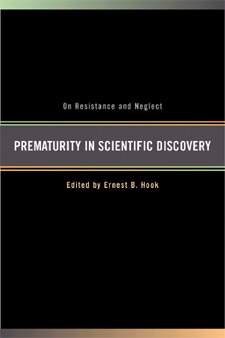 | Title: Prematurity in scientific discovery: on resistance and neglect Author: Hook, Ernest B 1936- Published: University of California Press, 2002 Subjects: Science | History of Science | Social and Political Thought | Geology | Evolution | Physics | History of Medicine Publisher's Description: For centuries, observers have noted the many obstacles to intellectual change in science. In a much-discussed paper published in Scientific American in 1972, molecular biologist Gunther Stent proposed an explicit criterion for one kind of obstacle to scientific discovery. He denoted a claim or hypothesis as "premature" if its implications cannot be connected to canonical knowledge by a simple series of logical steps. Further, Stent suggested that it was appropriate for the scientific community to ignore such hypotheses so that it would not be overwhelmed by vast numbers of false leads. In this volume, eminent scientists, physicians, historians, social scientists, and philosophers respond to Stent's thesis. [brief] Similar Items |
| 11. |  | Title: Entangled edens: visions of the Amazon Author: Slater, Candace Published: University of California Press, 2001 Subjects: Environmental Studies | Literature | Folklore and Mythology | Natural History | Latin American Studies | History of Science Publisher's Description: Candace Slater takes us on a journey into the Amazon that will forever change our ideas about one of the most written-about, filmed, and fought-over areas in the world. In this book she deftly traces a rich and marvelous legacy of stories and images of the Amazon that reflects the influence of widely different groups of people--conquistadors, corporate executives, subsistence farmers --over the centuries. A careful, passionate consideration of one of the most powerful environmental icons of our time, Entangled Edens makes clear that we cannot defend the Amazon's dazzling array of plants and animals without comprehending its equally astonishing human and cultural diversity. Early explorers describe encounters with fearsome warrior women and tell of golden cities complete with twenty-four-carat kings. Contemporary miners talk about a living, breathing gold. TV documentaries decry deforestation and mercury poisoning. How do these disparate visions of the Amazon relate to one another? As she fits the pieces of the puzzle together, Slater shows how today's widespread portrayal of the region as a fragile rain forest on the brink of annihilation is every bit as likely as earlier depictions to obscure important aspects of this immense and complicated region. In this book, Slater draws on her fifteen years of experience collecting stories and oral histories among many different groups of people in the Amazon. Throughout Entangled Edens, the voices of contemporary Amazonians mingle with the analyses of such writers as Claude Lévi-Strauss, Theodore Roosevelt, and nineteenth-century naturalist Henry Walter Bates. Slater convinces us that these stories and ideas, together with an understanding of their origins and ongoing impact, are as critical as scientific analyses in the fight to preserve the rain forest. [brief] Similar Items |